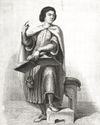
Criticising one of history’s most important-ever scientists can sound like a sketch from Monty Python: “OK, but apart from breakthroughs in optics, mathematics, mechanics, explaining gravity, inventing calculus, something about trigonometry, predicting how planets move, and other stuff that we don’t understand, what has Isaac Newton ever done for us?”
Newton’s work transformed science, and eventually, society. But Newton’s legacy comes with an ugly side: he inspired ‘physics envy’, which, in turn, led humanity to some truly dark places. ‘Physics envy’ is the desire to find Newtonian-type mathematical formulas or algebraic laws in other disciplines. Sometimes the endeavour is absurd, as when economists try to explain their economic opinions in algebraic equations. But when applied to psychology, history, class warfare, or evolution, thinkers with physics envy usually end up describing humans in dangerously oversimplified terms. Their theories would only work for model people - humans who have been stripped of their nuance and complexity. Moreover, as too many twentieth century tragedies have shown, when people become just elements in an equation, they can be treated as if they have no value at all.
This story is from the June/July 2023 edition of Philosophy Now.
Start your 7-day Magzter GOLD free trial to access thousands of curated premium stories, and 8,500+ magazines and newspapers.
Already a subscriber ? Sign In
This story is from the June/July 2023 edition of Philosophy Now.
Start your 7-day Magzter GOLD free trial to access thousands of curated premium stories, and 8,500+ magazines and newspapers.
Already a subscriber? Sign In

The Two Dennises
Hannah Mortimer observes a close encounter of the same kind.

Heraclitus (c.500 BC)
Harry Keith lets flow a stream of ideas about permanence and change.

Does the Cosmos Have a Purpose?
Raymond Tallis argues intently against universal intention.

Is Driving Fossil-Fuelled Cars Immoral?
Rufus Duits asks when we can justify driving our carbon contributors.

Abelard & Carneades Yes & No
Frank Breslin says 'yes and no' to presenting both sides of an argument.

Frankl & Sartre in Search of Meaning
Georgia Arkell compares logotherapy and atheistic existentialism.

Luce Irigaray
Luce Irigaray, now ninety-two years old, was, among many other things, one of the most impactful feminists of the 1970s liberation movements - before she was marginalised, then ostracised, from the francophone intellectual sphere.

Significance
Ruben David Azevedo tells us why, in a limitless universe, we’re not insignificant.

The Present Is Not All There Is To Happiness
Rob Glacier says don’t just live in the now.

Philosophers Exploring The Good Life
Jim Mepham quests with philosophers to discover what makes a life good.